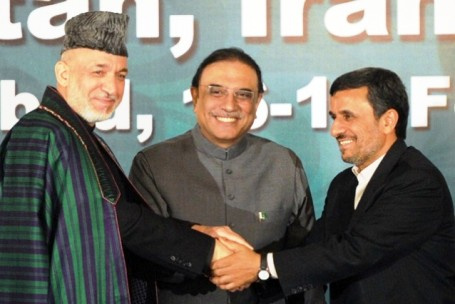Wary Neighbors Get Closer

Iran, Pakistan and Afghanistan; the three countries that have been a constant subject of interest for US leaders are converging, as Washington loses clout in the region. Afghanistan is negotiating with the Taliban to share power, albeit with the Americans’ green light, but Pakistan is drifting further and further away from Washington, when developments such as this prove how far the United States is going in its intervention in Islamabad’s domestic affairs. Some observers claim that Pakistan is doing the tango with Iran-- whose decisions determine if the US fails or succeeds in its Middle East ambitions-- to provoke Washington’s jealousy. Pir-Mohammad Mollazehi, Indian Subcontinent affairs analyst, has written on the trilateral meeting of the presidents of Iran, Afghanistan and Pakistan in Islamabad, and the future of relations between the three countries:
Tehran, Kabul and Islamabad are all entangled with problems in their international relations which they cannot tackle single-handedly. In this context, regional convergence seems to be an effective solution, hence the trilateral summit between Ahmadinejad, Karzai and Zardari. Nonetheless, one should also take into consideration the role of extraregional powers (the US, et al) which may affect the path towards convergence.
Pakistan is now facing serious problems in its relations with the US on issues such as jihadist groups and the role of the ISI (Pakistan’s intelligence service) in supporting them. Washington is trying to root out the terrorist jihadist groups-- mostly offshoots of alQaeda-- that are dwelling in the southern Waziristan region, and it this way, wants the Pakistani Army to enter this volatile region and expel alQaeda and its affiliates. Knowing the affinity between the ISI and the Haqqani network-- which nurtures the extremist groups in Pakistan-- the Army has so far refused to engage in such a dangerous venture. Pakistan feels that things will not end with its submission to US pressures, and it would be hard to predict, and control, the Waziristan region after the army enters the area. A lengthy civil war is a likely outcome of intervention in Waziristan affairs.
In the meantime, Pakistan worries about the US cutting military and financial aid, which Islamabad heavily relies on. At the moment, no third country seems to be able to provide Pakistan with the facilities the Americans have promised. A reorientation in relations with the US seem unlikely, but at a tactical level, Pakistan has thought of Iran, Russia and China as options for friendship which could ease Washington’s pressure and/or convince the Americans to rethink their policies. I think Zardari’s convivial remarks recently uttered are intended to ring the alarm bell in US government chambers. Islamabad is using Iran as a card, and none of the promises will be effective outside of paper.
Beside Afghanistan, Pakistan was sidelined by the US in negotiations with the Taliban. Qatar, the host and broker of negotiations, has proposed autonomy for the Taliban in western Afghanistan –meaningfully adjacent to Iran- and the Pashtun-dominated regions. Such proposals have alerted Kabul, Tehran and Islamabad, bringing them closer together to handle the problem of the Taliban through a regional cooperation framework. Nonetheless, since each party pursues its own goals, it is not clear if as a team they can remain united on this path. This is especially true of Pakistan that may take another shift as soon as it receives a new batch of US aid.

